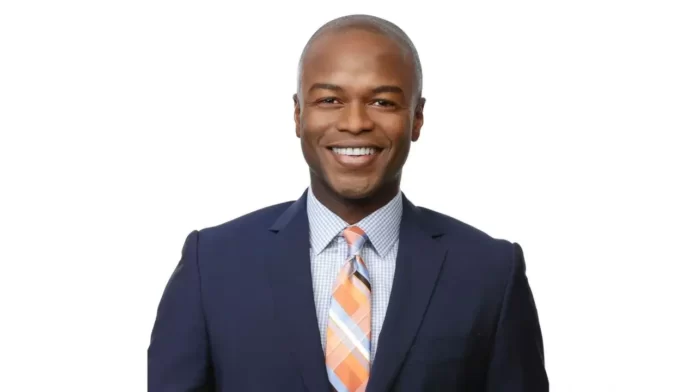Television anchors often become familiar figures in our daily lives, sharing moments of joy and sorrow with us. Kendis Gibson, a distinguished two-time Emmy-winning journalist, has been such a figure for many. Known for his work on ABC News, CNN, and CBS News, Gibson offers a unique memoir titled “Five Trips,” which dives into his profound experiences with psychedelics as a means of personal healing.
An intimate look at a journalist’s life
The book recounts the most memorable parts of Gibson’s illustrious career – from his on-the-ground reporting during 9/11 to interviewing monumental figures like Beyoncé. But this isn’t just a tale about journalism; it’s also a personal vignette into his continuous effort to heal from childhood trauma and the significant losses he faced along the way.
Gibson uses “Five Trips” not only to narrate his professional milestones but also to highlight his encounters with MDMA, psilocybin, ayahuasca, and LSD. These powerful substances assisted him in confronting deep-rooted issues such as racial trauma and the death of his first love. His story is one of resilience and transformation, showcasing how psychedelic experiences can foster healing.
The therapeutic impact of psychedelics
“Five Trips” earns its name from the pivotal psychedelic sessions that altered the course of Gibson’s life. It underscores the therapeutic potential these substances hold, backed by emerging studies demonstrating their effectiveness in treating conditions like anxiety, depression, and post-traumatic stress disorder (PTSD).
In certain states like Oregon and Colorado, psilocybin – commonly known as “magic mushrooms” – is gaining legal acceptance for medicinal use. Clinical trials are continually exploring its capabilities, offering new hope for those suffering from severe mental health issues.
Cultural significance and inclusivity
A significant element of Gibson’s memoir is his dedication to promoting an inclusive perspective on psychedelics. He aims to dismantle the notion that these substances are only associated with white culture. By exclusively interviewing experts of color, he shines a light on the rich histories of psychedelic use in African and South American communities. This focus brings attention to the marginalized voices within the discourse on psychedelics.
Through “Five Trips,” Gibson hopes to challenge the stigma surrounding psychedelics, portraying them as viable tools for emotional and psychological recovery, especially for Black and brown communities. The intention is to encourage people of color to consider these options for addressing their own traumas, thereby fostering greater acceptance and awareness.
A unique narrative style
Kendis Gibson’s storytelling interweaves personal reflections with broader insights, creating an engaging and thought-provoking narrative. Each psychedelic experience detailed in the book resonates deeply, providing readers with a vivid picture of the struggles and epiphanies that defined his journey.
One notable excerpt describes Gibson’s encounter with ayahuasca in the Amazon rainforest. This intense session forced him to confront his mortality in an unexpectedly profound manner. The visceral description of lying on a yoga mat in a remote Peruvian jungle, sensing his spirit nearing an ethereal plane, showcases the raw power of these mystical episodes.
The quest for inner peace
Each trip symbolizes steps toward embracing his Black identity and letting go of past pains. For Gibson, these journeys were essential in unveiling truths about himself, ultimately leading him to a path of self-acceptance and peace. Experiences of encountering universal elements, such as stars and cosmic visualizations, added layers of introspection and wonder.
The communal aspects of these ceremonies, including the presence of shamans and traditional practices like tobacco rituals, enhance his narratives’ authenticity and spiritual depth. They juxtapose his internal turmoil with serene surroundings, making each revelation even more poignant.
Broader implications of “Five Trips”
Beyond its autobiographical essence, “Five Trips” serves as a clarion call advocating for the decriminalization and therapeutic endorsement of psychedelics. Gibson emphasizes the importance of recognizing these substances’ benefits and potential in bridging gaps where conventional therapies may fall short.
The memoir invites readers to re-evaluate their preconceived notions about psychedelics. With growing evidence supporting their positive impact on mental health, there’s a burgeoning need for open conversations about integrating these ancient remedies into modern therapeutic practices.
An evolving landscape
As societal attitudes towards psychedelics gradually shift, stories like Gibson’s play a crucial role in initiating dialogue and dispelling myths. His courage in sharing both his personal battles and triumphs encourages others to explore unconventional pathways to healing.
According to Gibson, the greatest takeaway from the book is the message of hope it delivers. Regardless of one’s background or struggles, the potential for healing exists, sometimes in the least expected places. By opening up about his vulnerabilities, Gibson paves the way for a more inclusive and empathetic understanding of psychedelics and their capabilities.


